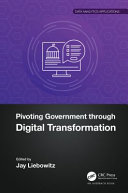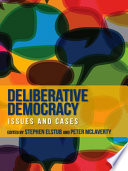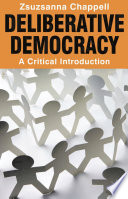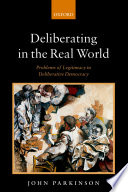Civic Tech Field Guide
Sharing knowledge and productively growing the fieldSearch Results - ATI (8148)
Showing 8148 Results

This is an especially powerful volume for those interested in the strengths and weaknesses of third world structures

Featuring research on topics such as language learning, school governance, and digital platforms, this book is ideally designed for professionals, teachers, administrators, academicians, and researchers.

In other words, it is still “business as usual”. This book questions whether Web 2.0 could help enhance citizens’ political participation.

This book examines how international organisations (IOs) have struggled to adapt to the digital age, and with social media in particular

This book advances a 'naturalized' normative theory of deliberative democracy; one that is informed by an empirically-grounded analysis of public deliberation in naturalistic settings and in unadulterated form, and goes on to provide

Social innovations are products, services and models that meet social needs and generate new social connections or collaborations.

Subjecting this claim to critical scrutiny, in this book, Andrés Luque-Ayala and Simon Marvin examine the cultural, historical, and contemporary contexts in which urban computational logics have emerged.

The Sourcebook for Political Communication Research will offer scholars, students, researchers, and other interested readers a comprehensive source for state-of-the-art/field research methods, measures, and analytical techniques in the

Bringing together perspectives from around the world, this volume examines emerging forms of citizen participation in the face of the evolving logics of political communication, and provides a unique and original focus on the gap which ...

Starting from the 1980s, this book provides the first, complete history of the idea of deliberative democracy, analysing its relationship with the earlier idea, and practices, of participatory democracy in the 1960s and 1970s.

Deliberative Democracy between Theory and Practice cuts across this debate by clarifying the structure of a deliberative democratic system, and goes on to re-evaluate the main empirical challenges to deliberative democracy in light of this

The Deliberative Democracy Handbook is a terrific resource for democratic practitioners and theorists alike

This thesis frames the ongoing collection of location data as an ongoing population survey. The ethics of data collection are beyond the scope of this work.

Using case studies from around the world, this book analyzes the recent wave of social movement and protests.

Highlighting a range of topics such as social media and politics, civic activism, and public administration, this multi-volume book is geared toward government officials, leaders, practitioners, policymakers, academicians, and researchers interested in active citizen participation and politics.

This is an essential guide for government employees, scholars, and regular citizens who want to make government work more effectively and democratically in the digital age.

Instructor and sustainable design expert Scott Boylston explains the relationship between design thinking and social innovation and teaches us about the impact design can have on global goals, including sustainable development, anti-racism, ...

This is the first book to provide much needed guidance and case studies from marine and coastal conservation.

Providing much needed insights for theory, policy, and praxis, this volume will be of interest to academics and students of public affairs, public management, governance, public health, public policy, and disaster and emergency management,

In this book, a number of leading democratic theorists address the key issues that surround the theory and practice of deliberative democracy

The chapters in this book focus on the design, development, implementation, use, and evaluation of information system technologies and methodologies to support crisis response and management, as well as technology management-related issues

In acht Kapiteln aus der Zeit von 2013 bis 2020 sucht Ingolf Pernice die Auswirkungen der Digitalisierung auf unsere Konzepte von Staat und Verfassung zu erschließen: Vom Strukturwandel von Öffentlichkeit und Politik und einem neuen Verhältnis von Staat und Bürger bis hin zu den Bedingungen einer "Verfassung des Internets" und den Möglichkeiten demokratischer Selbstbestimmung auch auf globaler Ebene

This book provides the most current and comprehensive overview available today of the critical role of information systems in emergency response and preparedness

An industry of consultants, facilitators, and experts of deliberative forums has grown over the past decades, suggesting that the field has benefited from a broken political system

Why are some civic associations better than others at getting - and keeping - people involved in activism? From MoveOn.org to the National Rifle Association, Health Care for America Now to the Sierra Club, membership-based civic associations constantly seek to engage people in civic and political action. What makes some more effective than others? Using in-person observations, surveys, and field experiments, this book compares organizations with strong records of engaging people in health and environmental politics to those with weaker records. To build power, civic associations need quality and quantity (or depth and breadth) of activism. They need lots of people to take action and also a cadre of leaders to develop and execute that activity. Yet, models for how to develop activists and leaders are not necessarily transparent. This book provides these models to help associations build the power they want and support a healthy democracy. In particular, the book examines organizing, mobilizing, and lone wolf models of engagement and shows how highly active associations blend mobilizing and organizing to transform their members' motivations and capacities for involvement. This is not a simple story about the power of offline versus online organizing. Instead, it is a story about how associations can blend both online and offline strategies to build their activist base. In this compelling book, Hahrie Han explains how civic associations can invest in their members and build the capacity they need to inspire action.

Summary of a Workshop on Using Information Technology to Enhance Disaster Management culminates phase 1 of the project

The book can empower social entrepreneurs and innovators to develop and implement ideas for the betterment of society at large.

From planning to executing to evaluating citizen science research, the range of useful material in this book is astounding."--Allen Fish, Golden Gate National Parks Conservancy

This book provides an ideal starting point in understanding the core concepts of deliberative democracy

This book explores the potential of the Internet for enabling new and flexible political participation modes.

From a perspective of practice, this research offers new insights into how organizations might recognize and more confidently integrate key design attitude capabilities that can result not only in social innovation outcomes, but also in ...

Covering topics such as digital democracy, data extraction techniques, and political communications, this book is an essential resource for data analysts, politicians, journalists, public figures, executives, researchers, data specialists, ...

However, even less research attention has been paid to co-design than to social innovation. This book explores the potential of co-design as a social innovation process.

Digital Democracy considers how technological developments might combine with underlying social, economic and political conditions to produce new vehicles for democratic practice. The growth of new Information and Communication Technologies (ICTs) such as the Internet, alongside growing concerns about the failure of advanced societies to live up to the democratic idea, has produced much interest in the prospects for a digital democracy. This book will provide invaluable reading for those studying social policy, politics and sociology as well as for policy analysts, social scientists and computer scientists.

Please note that the content of this book primarily consists of articles available from Wikipedia or other free sources online

And why would people with passionatelyheld views sit down and deliberate when there seems little advantage in them doing so?This book explores these problems in theory and practice, searching for a solution that does not merely dismiss a

The powerful potential of digital media to engage citizens in political actions has now crossed our news screens many times










